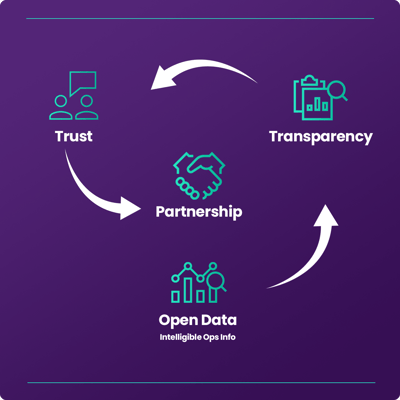In our recent webinar (watch here), we dissected Total Facilities Management (TFM) contracts: those all-in-one deals that provide a total FM provision.
One of the speakers, talking from a customer’s perspective, explained that their business had thrown out the last three (!) contracts when renewal came up, switching not only the provider but the type of contract in all three cases.
It seems that their dissatisfaction was levelled at the nature of the contracts, as much as the supplier themselves. And they aren’t the only ones, many companies seem to switch contract type every time a new tender is undertaken, flitting between TFM and specialised individual services.

Why are businesses changing their Facilities Contracts?
Maybe these companies are suffering from shallow thinking or poorly conceived tenders (tender-nitis if you like), but I think the most pertinent reason for customers switching is the lack of mutual understanding they have between themselves and their FM providers.
The feeling is mutual
Beyond their SLAs and KPIs suppliers might not really know what the client’s expectations are. Of course, the client wants a clean, secure, safe and compliant building with well-maintained assets, but what do they want from management?

The problem is that, coming from the other side of the argument, the client might struggle to articulate what they want from a partnership if they don’t really understand what their supplier does at a management level.
They might understand that cleaners clean and security guards patrol the building, but how is management adding value?
The partnership trifecta (Trademark pending…)
Management’s value comes in part from their ability to build relationships with their clients.
Relationships are all about trust, trust is built on transparency, and transparency is built on open, intelligible data. I’ve called this the Partnership Trifecta.

The ‘old school’ reporting strategy of using performance audits with scoring and a monthly client review, can’t adequately demonstrate management’s value or foster stronger customer relationships.
The value you provide comes entirely from an ability to evidence what your management are doing, not how your contract staff are performing.

You can’t cover all bases
Not having the right data easily available will put strain on any contract, regardless of how well the service is delivered.
Particularly with larger TFM contracts, there are many moving parts, often across the whole country, or internationally, with multiple sites and a network of sub-contractors assisting to deliver a total service.
It’s inevitable that this will serve some parts of your customer’s business better than others – even the most diligent, geographically diverse providers would struggle to deliver a consistent service in these conditions.
What you don’t know will hurt you
This is where the problems regarding understanding begin to creep in.
As a supplier, are you trying to satisfy the central estates team or the individual site managers? Are the business’ objectives the same from one site to the next?
If neither the provider nor the customer has the right information to judge why site A is performing much better than site B, it encourages emotive judgement, and you will be blamed regardless of who is at fault.
This conflict becomes unresolvable because the provider can’t demonstrate what they are doing to intervene.
Worse, you could be making meaningful improvements and innovations but still be struggling to demonstrate this with the traditional audit.
What good looks like
Much like chess, the answer to this problem is simple to understand and hard to master.
There are three keys to good data: structure, regularity and granularity.
If you’ve ever turned up to a site to audit the washrooms, using a single piece of A4 paper and 8 questions, only to discover the site has 110 sets of washrooms, then you certainly know what the wrong level of granularity is.
Building on good to make it better
It’s flippant to say that a traditional audit is useless, it is the bedrock of the data gathering piece. But deploying the right digital tool will allow you to start doing more.
Audits should be structured by location, going down in granularity to a single room. For example, a suitable cleaning audit might look at a single washroom and be scheduled weekly.
Attaching a QR code (also known as an NFC tag) to the location will make your auditors life even easier: they just have to scan the code to open the right audit. 
And if your operatives do the same - you can collect proof of presence and time spent data, as well as a list of common failures raised. Now you are getting good!
It’s then a simple step to benchmark the performance of that washroom against all the other washrooms in the building, across the whole contract and your entire business.
Aligning your goals
Having shared this data in an intelligible format (remember the structure!) with your customer, you can start to have open, productive discussions with them to better understand and deliver the service they want.
This data will also help to direct your efforts and makes it far easier for your client to articulate what they need.
Imagine you’re contracted to clean a supermarket. With your detailed audit scores and supporting ‘time to clean’ data, the customer might be able to explain that, rather than an even split between warehouse and shop floor, they want to try a 60/40 split, because the warehouse just needs to be safe, while the shop floor needs to be spotless
 Working with your customer, you can measure the outcome of this rebalancing, and if it’s been a success, roll it out across more sites.
Working with your customer, you can measure the outcome of this rebalancing, and if it’s been a success, roll it out across more sites.
The point is that merely providing a score to your customer and leaving it at “High score good, low score bad,” isn’t constructive for you or for them. Data needs to be the foundation on which you build a successful partnership, understanding your client’s needs and demonstrating that you know what is really going on within the service you provide to them.
What your manager should be doing
Managers shouldn’t be lost in complex excel sheets, creating graphs and tables to copy and paste into monthly Power Points - let technology do this grunt work.
Instead, managers should have the time to focus on adding value, conducting audits and analysing how they are going to improve the service and make efficiencies.
It’s a big win if you can identify cost-neutral moves because of this additional level of awareness, taking resource from over performing areas of a contract and redistributing them to struggling sites.
Make yourself indispensable
Holding onto contracts is a perennial issue for FM providers.
I’ve spoken before about how TUPE regulations mean that the dispensable element of an FM company is its management, not the field teams. New approaches to data and information sharing are sure to foster more sustainable partnerships built on trust.
Make sure you stand out from the competition by being smart with data and telling your customers everything they need to know. Mistakes will happen, but it’s the providers that demonstrate self-awareness and deep thinking about the problems that will hold onto their contracts.




